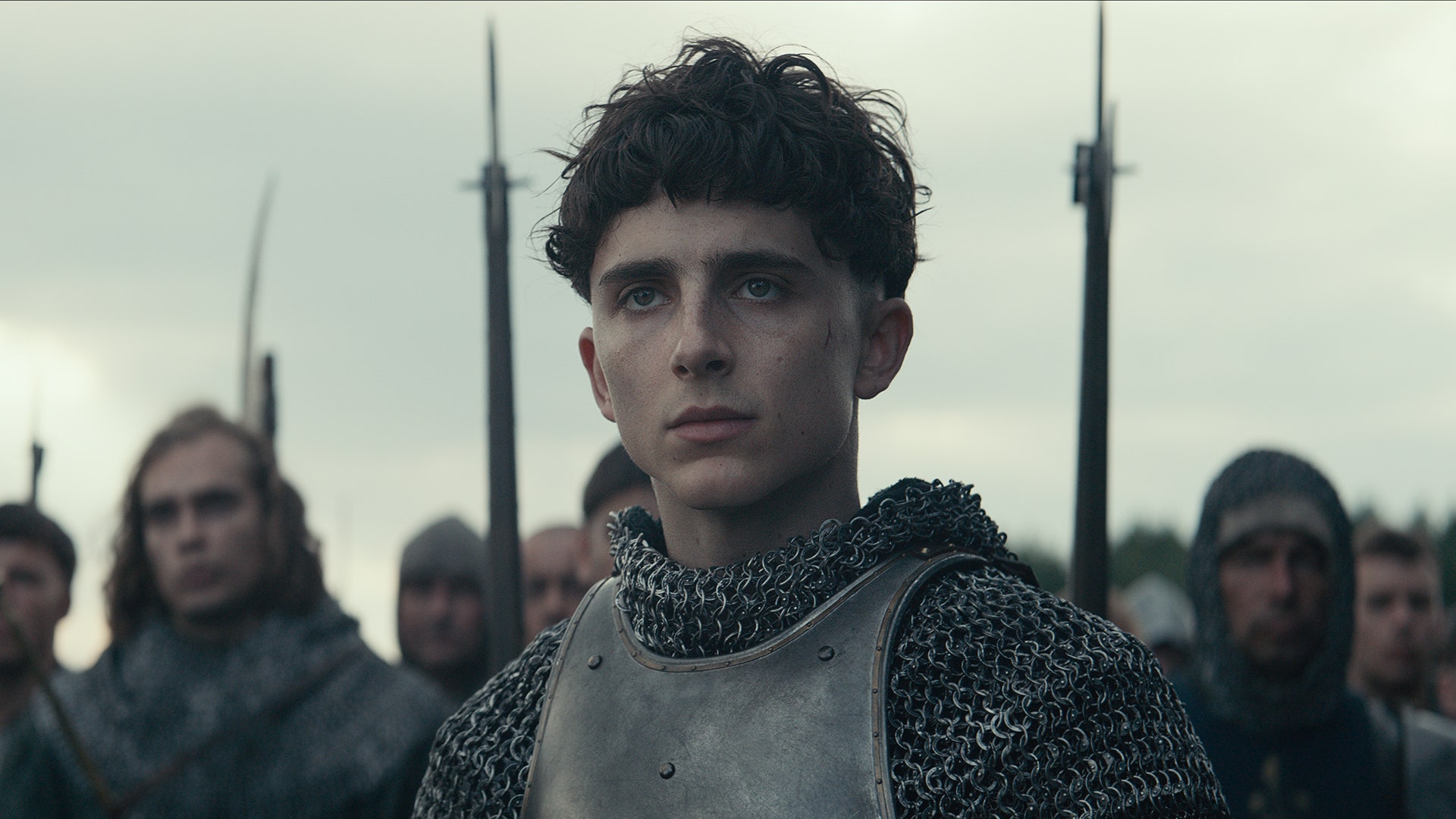Adapting Shakespeare is a territory rife for mistakes: too rigid an adaptation, too close a bearing to the original language, and you can leave the whole thing inaccessible. Too abstract a display – see: most student theatre – and you run the risk of losing what made the work so powerful to begin with. Striking the balance of contemporary and classic is no easier, yet that's what David Michôd’s The King aims for. Ostensibly an adaptation of Shakespeare’s Henriad – a series of four historical plays that depict the reigns of Henry IV and his son, Hal (Timothée Chalamet) – Michôd’s period epic takes as many liberties with the original text as Shakespeare did with reality. It slices, dices and carves with the wild erraticism of a blindfolded knight.
But a knight has instincts. And even though The King goes as far as to suggest that the drunkard Sir John Falstaff (played with gusto by Joel Edgerton) was the genius mind behind the Battle Of Agincourt, it kind of works. At some points, even, it works tremendously well.
You probably studied the Henry plays at school – or, if you’re a Keanu Reeves stan, you’ll have seen My Own Private Idaho, which remains the best adaptation of the lot – but, for the uninitiated: The King follows Hal, the eldest son of King Henry IV. Reticent to take up the responsibilities of kingship, Hal is far from the regal leader his father would have him be, preferring to spend his nights drinking and whoring with the rabble in Eastcheap (think Dalston, but grungier). But with his father quickly approaching mortality, Hal is forced to mount the throne that he so vehemently detests. And, as it comes to pass, he’s pretty good at the whole leadership thing.
This isn’t Chalamet’s best work, but it’s very, very good. Perhaps my reservations are symptomatic of the fact that he set such an immensely high bar with his earth-shattering performance in Call Me By Your Name (until Green Book won Best Picture in April, his Best Actor loss was on track to be the most egregious Academy Awards miss of the decade). My biggest critique? It certainly won’t disappoint his ardent fan base, but, my lord, does he need to polish off his RP accent. It’s far from the film’s worst attempt, though: Robert Pattinson’s French accent as the Dauphin – as fun and flamboyant as the rest of his performance is – comes off as a soft-boi version of Pepé Le Pew.
There is a clear respect for, and understanding of, the Henriad in here somewhere. But much of The King – as evidenced by the fact that Pattinson’s good-bad faux French was ever greenlit – feels remarkably lazy. The most egregious event of the lot comes with the film’s denouement: on the eve of their marriage, Catherine Of Valois (Lily Rose-Depp in a succinct cameo) tells Hal that she can’t speak English. Then, in perfectly verbose English, she embarks on a long tirade about Hal’s war efforts, going in on what she perceives to be Hal’s lack of decisiveness – and, well, the fact that he’s just murdered her brother. It’s a very silly, avoidable inconsistency.
Michôd’s version of Shakespeare also aims to benefit its audience by rewriting the play’s floral dialogue – but that’s also where The King lost me. I came into the film excited to see Chalamet’s rendition of a nice, meaty Shakespearean soliloquy – “Once more unto the breach” is arguably the meatiest of them all – and yet when the times comes around, he simply shouts, eyes glancing pointedly to the side: “Do you expect me to deliver a speech?” How very meta. And how very annoying.
As much as I enjoyed The King, the overbearing thought I had was this: do we really need another dark, edgy period adaptation of the Henriad? Or of any Shakespeare plays at all? Olivier did it in the mid Forties, Branagh in the late Eighties, and the BBC’s The Hollow Crown gave us another in 2012. Compounded by the amount of edgy period dramas that now saturate our screens, from Game Of Thrones to The Favourite, it all feels slightly redundant.
Now read
Joker is both morally confusing and surprisingly good


